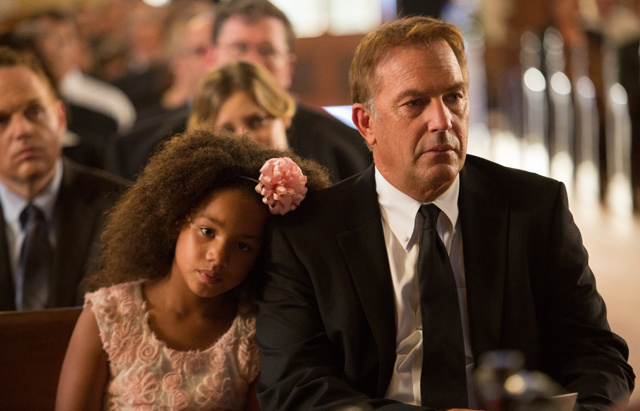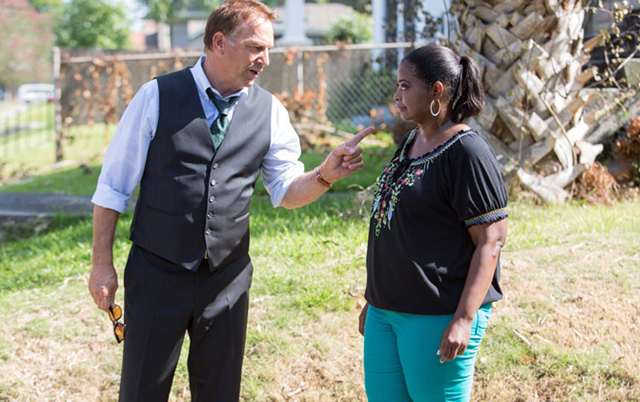CHICAGO – In anticipation of the scariest week of the year, HollywoodChicago.com launches its 2024 Movie Gifts series, which will suggest DVDs and collections for holiday giving.
Story Choices Aside, Heart Matters in ‘Black or White’
 Rating: 3.0/5.0 |
CHICAGO – As race issues continue in the news, in the wake of Ferguson and “I Can’t Breathe,” the movies exhibit an extraordinary piece of timing with the new film “Black or White.” Oscar winners Kevin Costner and Octavia Spencer participate in a story of family and healing.
The issue in the film involves “Black or White,” but mostly in the context of what the opposing families want for a biracial girl suddenly being raised by her white grandfather (Costner). Written and directed by Mike Binder (“The Upside of Anger”), the film explores themes of socioeconomic separation as much as opposing racial views, and mostly it shows that both sides care ultimately for the little girl. Kevin Costner also steps outside his usual character mode, playing the grandfather as a mourning and boozy figure of tragedy, and a morally vague arbiter of the racial issues that have been thrust upon him. However. the film does suffer from some easy clichés, including a crack-smoking biological father and a TV-law-drama type custody trial, although the setting does gives Costner a defining and passionate moment regarding what the film is trying to communicate.
As the film begins, Eliot Anderson (Costner) is mourning the loss of his wife in an auto accident. He is left to raise their granddaughter Eloise (Jillian Estell), after he and his wife had adopted her when their daughter died in childbirth. Eliot’s daughter had hid the pregnancy, and the father was an African American man named Reggie (André Holland). Reggie’s activities involvement in gangs and drugs has estranged him from his daughter, and elicited wrath from Eliot.

A Sad Funeral for Eliot (Kevin Costner) and Granddaughter Eloise (Jillian Estell) in ‘Black or White’
Photo credit: Relativity Media
The other side of Eloise’s family, led by matriarch Rowena (Octavia Spencer) – who is also Reggie’s mother – challenges Eliot for custody of Eloise, and retains Rowena’s high powered lawyer brother Jeremiah (Anthony Mackie) to process the trial. The trial opens old wounds, and includes the return of Reggie, and Eliot must control several of his own demons if he is to maintain custody of his granddaughter.
There is a lot of love in this film, and that’s what makes the improbable situations – the return of Reggie, the trial itself and the use of a tutor as comic relief – easier to contemplate. Writer/director Mike Binder definitely wanted to express the different approaches of family in Eliot and Rowena, but mostly he sought to bring together their commonality, the girl connected to both of them. The trial does have one moment of exceptional clarity and truth – Costner’s character speaks of his struggle with “seeing” skin color, which becomes emblematic of a broader truth in America.
The trial, however, is a bit too cutesy, and felt like one of those easily summed up legal confrontations that are often seen on TV lawyer dramas (think “Ally McBeal”). Even those outside the legal custody system would recognize a situation that would never go to trial, given a father with a history of drug use – which he conveniently begins again when he reappears – and the relative cooperation between the two families. The trial was used as a drama device only, and contained several glaring missteps.
The film’s strengths lies in Costner’s performance, which takes a drinking habit and multiplies it tenfold when his wife tragically dies. It fuels his anger, and leads to several nasty confrontations with the biological father, indicating the type of racism that occurs with socio-economic “white privilege.” The movie bravely confronts it, and Costner’s performance pulls no punches.

Eliot and Rowena (Octavia Spencer) in ‘Black or White’
Photo credit: Relativity Media
Octavia Spencer works hard on the Rowena character, but what was missing was why Reggie ended up the way he did. The movie makes makes sure to show, almost too much, that Rowena is a successful entrepreneur with a no-nonsense approach to life. Why such a character would not have taken the bull by the horns in regard to her son’s drug habit hangs in the air. The flitting between the powerful truths in racial face offs and the inconsistencies of story make the overall film a bit schizophrenic, but the strengths are robust enough to make it worthwhile viewing.
One more interesting observation that the film makes – the white upper middle class Costner is suddenly alone in raising Eloise, while the African American side is awash in passionate family. The joy of the film is the enfolding of both sides, with the love of their genetically-combined relative bringing everyone together. To answer Rodney King, they can “get along.”
 Click here for an interview with Kevin Costner, Anthony Mackie and Director Mike Binder of “Black or White,” by Patrick McDonald
Click here for an interview with Kevin Costner, Anthony Mackie and Director Mike Binder of “Black or White,” by Patrick McDonald | By PATRICK McDONALD |


